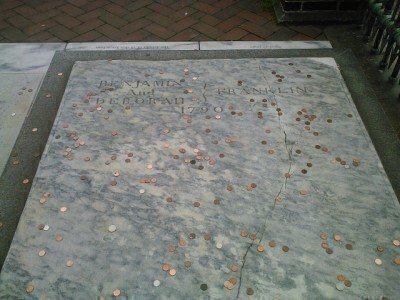Today marks the anniversary of Benjamin Franklin’s death, which drew many different responses from the citizens of Philadelphia (who mourned in droves) and the U.S. Senate (which refused to mourn Franklin).
 Franklin had been ill for some time, and his last major public appearance was at the Constitutional Convention in 1787. He knew his time was short in April 1790 and worked to make sure that the proper obituary was written in advance.
Franklin had been ill for some time, and his last major public appearance was at the Constitutional Convention in 1787. He knew his time was short in April 1790 and worked to make sure that the proper obituary was written in advance.
The Pennsylvania Gazette announced his passing. Another contemporary newspaper, the Federal Gazette, summed up public opinions about the Founding Father in its brief obituary.
“Died on Saturday night, in the 85th year of his age, the illustrious BENJAMIN FRANKLIN. The world has been so long in possession of such extraordinary proofs of the singular abilities and virtues of this FRIEND OF MANKIND that it is impossible for a newspaper to increase his fame, or to convey his name to a part of the civilized globe where it is not already known and admired.”
Reportedly, Franklin’s last words were, “A dying man can do nothing easily.” Newspapers in Boston said that Franklin had been ill for several weeks, and they made sure readers knew that Franklin was born there.
His passing was duly noted in Europe. Franklin’s reputation as a scientist, inventor, author, and statesman extended there for decades, where the French considered Franklin a true Renaissance man.
The French National Assembly went into mourning. “He was able to restrain thunderbolts and tyrants,” said Count Mirabeau.
Franklin’s funeral was on April 21, 1790, and at least 20,000 people attended it. By current estimates, the population of the city of Philadelphia in 1790 was 28,000.
His coffin was carried by the most powerful men in the state of Pennsylvania and escorted to Christ Church by a crowd of citizens that included a contingent of printers and members of the American Philosophical Society, which Franklin founded. Absent from the event was President George Washington and members of Congress, who were in New York City.
Thomas Jefferson had returned from France in 1790 and visited with Franklin in Philadelphia about one month before his death. In his eulogy for Franklin, Jefferson told the story about his response to people in France who asked if he was really in that country to replace Franklin.
“I generally answered ‘no one can replace him, Sir; I am only his successor,’” Jefferson said. He said that there was "more respect and veneration attached to the character of Doctor Franklin in France than to that of any other person in the same country."
James Madison also recalled Franklin with respect: “I had opportunities of enjoying much of his conversation, which was always a feast to me. I never passed half an hour in his company without hearing some observation or anecdote worth remembering.”
Franklin had written his epitaph in 1728, which reappeared after his passing.
“The Body of B. Franklin, Printer; like the Cover of an old Book, Its Contents torn out, And stript of its Lettering and Gilding, Lies here, Food for Worms. But the Work shall not be wholly lost; For it will, as he believ'd, appear once more, In a new & more perfect Edition, Corrected and amended By the Author.”
Nationally, newspapers covered the funeral of the most famous of all Americans.
And in France, it was assumed that Congress and the president would join the French government in mourning Franklin.
Count Mirabeau stated, “The Congress has ordained throughout the United States a mourning of one month for the death of Franklin, and at this moment America is paying this tribute of veneration and gratitude to one of the fathers of her Constitution."
That wasn’t true.
Madison asked his colleagues in the House of Representatives to wear symbols of mourning for one month, and they agreed.
The Senate declined. The chamber was influenced by John Adams, who disliked Franklin, as did Richard Henry Lee. The Senate also ignored tributes about Franklin sent by France. Franklin, in his lifetime, had been critical of a government that had two houses of the legislature, and his grandson, Benjamin Franklin Bache, was a newspaper publisher openly critical of the Federalists who controlled the Senate.
Jefferson lost an argument with President George Washington for the executive branch to wear mourning symbols. Washington feared the act would set a precedent for all Founding Fathers and that it was too similar to how royalty was honored in Europe.
The first official eulogy for Franklin in the United States didn’t happen until 1791.






